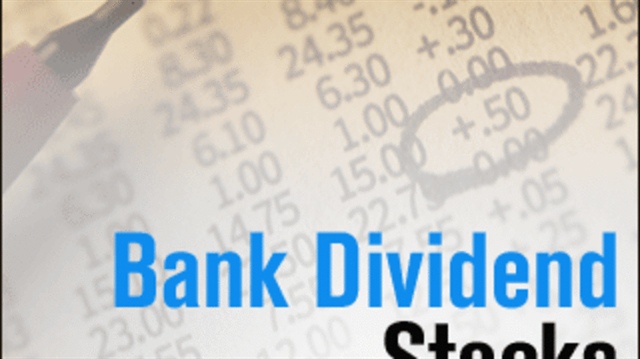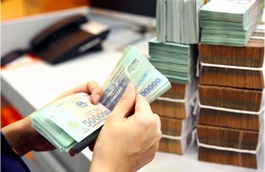Banks reveal plans to pay dividends in cash
Banks reveal plans to pay dividends in cash
All commercial banks are planning to increase their capital greatly in coming years, in which the stock dividend will still be the mainstream. However, it is still a distant dream that shareholders will receive dividends in cash in the near future.
Illustrative photo. |
Dividends in shares
During the 2022 shareholders meetings, some banks revealed plans to pay dividends in cash. Mr. Ngô Chí Dũng, Chairman of Board of Directors of VPBank, shared with shareholders who were still sitting at the meeting until the last minute, that the bank had enough grounds for growth for the next five years. The bank expected from next year to submit to the Annual General Meeting (AGM) of shareholders, to pay a cash dividend of up to 30%.
This year, VPBank approved the plan to pay dividends and bonus shares from equity at the rate of 50%, which is expected to be implemented in the second or third quarter of 2022. Vietnam International Commercial Joint Stock Bank (VIB) approved the proposal to distribute bonus shares at 35%. Vietnam Maritime Commercial Joint Stock Bank (MSB) and Orient Commercial Joint Stock Bank (OCB), both have plans to share bonus shares with shareholders at 30%. Military Commercial Joint Stock Bank (MB) also plans to increase charter capital by VND 7,556 bn by issuing 755.6 million shares to pay dividends, equivalent to 20%. The dividend pay-out ratio is also high in many other banks, ranging from 10% to 20%.
Commercial banks with state capital will also soon integrate into the race with joint-stock commercial banks when paying dividends in shares, issuing bonus shares from surplus capital to increase charter capital, and improve capital adequacy ratio. At the last AGM, Vietcombank approved the plan to issue 856 million ordinary shares to pay dividends from the remaining profit of 2019 and 2020, which was implemented in 2022. VietinBank will issue more than 569 million shares to pay dividends to increase its charter capital from VND 48,057 bn to VND 53,751 bn. Bank for Investment and Development of Vietnam (BIDV) has approved a plan to issue more than 607 million shares to pay dividends of 2021 from undistributed after-tax profits.
For joint stock commercial banks, paying a part of cash dividends is only a future plan. The proof is that since the beginning of the year, the State Bank of Vietnam has requested that in order to continue effectively implementing solutions to support people and businesses, and reduce lending interest rates, banks need to cut operating costs and reduce profit targets, with no cash dividend in 2022. For many years, shareholders of JSCBs have not received cash dividends but have only been divided into shares at the request of the State Bank of Vietnam.
Cash distribution difficult
Starting from 2020, commercial banks were facing pressure to increase capital to raise capital adequacy ratio and meet the criteria of Basel II and move to Basel III and pay dividends mostly in shares at the request of the State Bank of Vietnam. State-owned commercial banks were initially still in the exception group, having to pay cash dividends to state shareholders, but this group continuously proposed to pay dividends similar to joint-stock commercial banks. This was approved by the Government by including in the list of fields that allow additional investment in the state capital where the state holds more than 50% of charter capital.
Previously, the cash dividend ratio was very low, but now it is divided by shares at a very high rate, to which the charter capital of commercial banks has accelerated sharply. Data released by the State Bank of Vietnam by the end of September 2021, shows the total charter capital of the entire system of credit institutions reached VND 715,580 bn, up 8.32%. Of which, the group of commercial banks with state capital had a total charter capital of VND 169,690 bn which was up by 9.29%, and the group of joint-stock commercial banks had VND 348,481 bn, up by 9.88%.
In a report released in September 2018, Fitch Ratings forecast that the Vietnamese banking system could face a capital shortfall of nearly USD 20 bn, equivalent to 9% of GDP, to meet the implementation of Basel II standards expected to apply from 1 January 2020. In a report released in early 2022, Fitch Ratings said that the capitalization of Vietnam's banking industry has improved in recent years because of good profitability and banks actively raising capital to meet Basel II requirements.
However, the banking system is expected to need additional capital of USD 10.7 bn, equivalent to 2.9% of GDP, to ensure the loan risk provision to cover possible losses from all problem loans, and at the same time maintain the CAR at 10%. Fitch Ratings assesses that compared with international banks as well as in a risky business environment, Vietnam's banking system is still thin in capital.
Banks also understand well their own problems, so the plan to increase capital is always a constant need. In fact, with the Covid-19 pandemic risks have also increased, and banks are forced to actively tighten the safety buffer that is the CAR coefficient to respond well in volatile market cases. At the same time increase capital to have the cash to invest in digital transformation, and increase financial capacity to expand credit activities.
Based on the plan this year, the total charter capital of banks can increase by VND 154,000 bn, 1.5 times higher than the VND 100,000 in 2020. Although there are many options such as issuing more shares to domestic and foreign investors and selling shares to strategic partners, the increase due to dividends and bonus shares is still overwhelming. In such a case scenario, cash dividends will probably return in the next few years but will only be scattered in banks with strong potential.
Although shareholders are not allowed to receive cash dividends, in the last two years there have been very few pressing opinions on this. Currently most commercial banks have liquidity, and dividend is still better than no dividend.





























